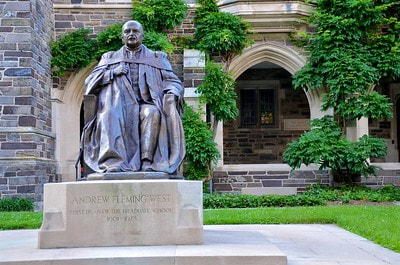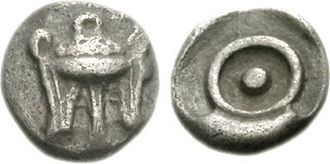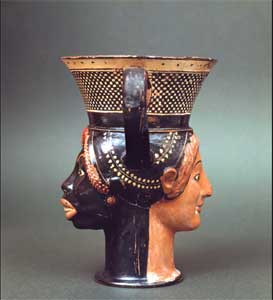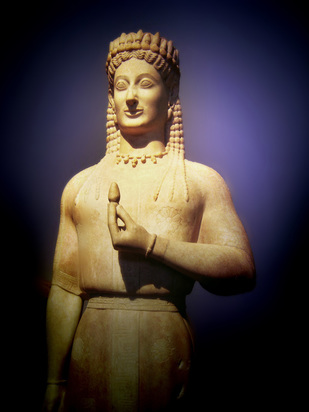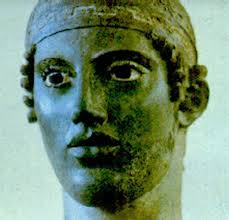|
|
The organization of teaching and learning through departments, we often forget, is a relatively recent arrangement in American higher education. At Princeton University this didn’t happen until 1903, when under its new president, Woodrow Wilson, it established a new pattern based on eleven departments. This case study of one of them, the Department of Classics is especially interesting because Wilson appointed as its head the man who became his arch opponent, Andrew Fleming West. It also brings out the boldness of Wilson’s plans, and the question of how well they worked.
City Dionysia and Athenian Democracy
Greek tragedies were performed in a festival of Dionysus. When was that festival established and how does it relate to Athenian democracy and ideas of freedom? Click on the title above for a discussion that seems more relevant than ever. Fear in a Pandemic and in Thucydides
"We must re-learn how to fear." Can two types of fear in Thucydides help us? A discussion with a dozen friends and scholars, plus some second thoughts of my own. Inspiration and Interpretation: A Test Case, Aristonice, A Pythia
Inspiration and Interpretation are two sides of the same coin. They can't be understood separately, as the story of the Pythia Aristonice shows. Click above to see. The Classics Now
What is the evidence about the current situation of the Classics and what are the opportunities for the field right now? This is a revision of an article published in Classical World in Spring 2016. 
THE THINKING GREEK PROJECT:
I've been trying to think about thinking --specifically how ordinary Greeks, of the classical period thought. How they thought, not what they thought; not what the high powered philosophers and other intellectuals thought, but what patterns they shred with ordinary people. Below are some probes at these issues. Suggestions are much appreciated! Witchcraft in Fourth Century Athens? The Case of Theoris
Theoris, an immigrant from Lemnos into Attica, in the fourth century BCE, was indicted by Demosthenes, tried, convicted, and put to death, along with her whole family. Can this be best understood by comparing it to a witchcraft trial? " … a guiding principle. It works …because it keeps the focus on what is distinctive in our fields, and hence on what Classics’ distinctive contribution to can be. "
Skin Slurs: Black and White
Some friends who read my essay SKIN noted that while it had a lot to say about body piercing and cutting, it said almost nothing about skin color. Is it possible, one of them wondered, that we picked up from the Greeks our practice of using skin pigment as a sign of racial inferiority? Can we blame the Greeks for this? Mysterious Veiled Women and the Men Who Wrote About Them
A recurring image in ancient Greek texts - a veiled woman, often likened to a bride, a nymphē - points to a mode of thought that persisted in various forms from Archaic Greece to the second century of our era. It is often associated with breath, pneuma, that is, with inspiration understood in a physical sense. The authors discussed include Hesiod (Theogony), Parmenides, The Shepherd of Hermas, and The Revelation to John in the New Testament. These texts, all by male writers, reflect a view of reality as something just barely glimpsed, but they also raise the question whether these men found in this image a way to move beyond modes of thinking deeply rooted in the male’s sphere of activity, and accessing another way of comprehending - associative, visual, and evocative. Click the title link to read the text. Thucydidean Notes:
The Chronology of Athletic Nudity Among the Greeks Thucydides 1.6.5 and What Happened After the Eclipse in Sicily, August 413 BCE? Thucydides 7.50.4 Many scholars believe that the disaster suffered by the Athenian army in Sicily in 413 BCE was caused by the superstition of the Athenian troops and of one of their their commanders, Nicias, reinforced by their interpretation of an eclipse by Athenian seers (manteis). A close reading of our primary source, Thucydides 7.50.4 yields quite a different picture of what happened, and brings to light a moment when the Athenian army functioned as if it were the city’s deliberative assembly. In this the manteis play a significant but limited role. The delay that resulted from the eclipse did not at the time seem a strategic blunder or act of blind superstition. Susan Goes to College
Susan Smith is a modal student. Maybe she's a model student too. But for our purposes, she's a modal student, a statistical construction based on the most common patterns in American higher education. I met her while I was trying to figure out what was really happening in the immense, varied, sprawling world of higher education in this country. Some statisticians told me that there is no Susan--no modal student--in a system as complex as American higher education. They are right about the complexity; Susan, I expect, finds it baffling too. But I believe that if we don't look for the typical, we might be in danger of overlooking the reality that surrounds many of today's college students. So here is Susan's story, chapter by chapter. Enjoy! Bob Connor March 2010 Chapter 1: Meeting Susan In which I meet eighteen-year old college student Susan Smith for the first time and discover that she's from the population center of the country |
"Was there such a thing as ancient Geek religion? Surely there was; the great scholar Walter Burkert wrote a book with that title; … but something is missing among the Greeks – a word for “religion.” How did they get along without this convenient bushel basket into which we dump so much? …" Click Above to Read On
Politically Speaking
Do we have the vocabulary we need to think through what is happening to us in a time of political crisis? My hunch is that we have it, but aren’t using it, at least as much as we should. Case in point: demagogue and “demagogy. These ancient and uncompromising terms have to a large extent been displaced by the neologisms, “populist” and “populism.” They aren’t synonyms. In an essay called “A Vacuum at the Center” in a recent issue of American Scholar I explored a political dynamic that can best be understood by calling a demagogue a demagogue. Hyperbole is another case in point. It’s not the same as a harmless exaggeration or a deliberate lie, even though it overlaps with them. It too has a dynamic of its own – one that demagogues often understand better than the rest of us. I explored that dynamic in "When Hyperbole Enters Politics" in the Spring 2019 issue of Arion. And what about plutocracy? It’s not the same as the concentration of national wealth in the top few percentages of the population. Once again, it’s a Greek term that has fallen by the wayside in recent political discourse. Does it too have a dynamic that we need to understand in our present distress? I’m trying to write about plutocracy right now, and welcome instances, passages, examples and ideas from old friends and new readers. Let me hear from you. I appreciate your help. The Chronology of Athletic Nudity among the Greeks Thucydides 1.6.5
Thucydides’ comments in 1.6.5 on the origin of naked athletic competition among the Greeks (1.6.5) have often been taken as contradicting the tradition that Orsippos of Megara was the first to compete naked, at the Olympic games of 720 BCE. Thucydides' comments, however, are part of an elaborate narrative structure , Understanding that structure clarifies what Thucydides intended, and shows there is no need to dismiss what he said. 
Your Generation and Mine: A Letter to a Younger Classicist on Fifth Century Athens
You spoke of “virtuous Athens,” and I said, such phrasing “gives me the willies.” You asked why, and I found that I could only answer by looking in the rear view mirror at how my generation studied classical Athens. … Click above to read on! On Living Without a "Factual Mind-Set" - The Perspective of Thucydides 1.20 -24.
" … But what about the Greeks? Did they have a “factual mind-set”? I realized to my embarrassment that in thinking about how the Greeks had thought I had paid little attention to their views about "facts." There was a reason for that: ancient Greeks, at least for some centuries, seemed not to talk about facts. So when I tried my usual thought-experiment of translating contemporary terms into ancient Greek I bloodied my nose against a stone wall. …. Read more by clicking the title link Methodologically hazardous this THINKING GREEK stuff? Sure but worth the risk.!
Classics Now: Changing Discourses, Emerging Opportunities
"Classics is well positioned to respond to this shift in discourse. It’s a field where many high-impact practices are standard operating practice, and where it is relatively easy to be more systematic about them…" Is the American Dream Fading? And What Does that Have to Do with Higher Education?
New and Noteworthy Newsletter February 2015 Liberal Education, Student Debt and Much, Much More
New and Noteworthy Newsletter June 2014 Getting student loans & the focus on their educational effects is a major topic in this new edition of the Newsletter. The Health of the Humanities, Obama's Big Stick and Other Hot and Heavy Issues in Higher Education
New and Noteworthy Newsletter, Summer 2013 The $820,000 tuition bill, the real story about MOOCs, and more
New and Noteworthy Newsletter, May 2013 Newsletter Summer 2012
Are mass on-line course compatible with liberal education? This and other issues (including Joe Paterno's damnatio memoriae) are explored in the second of these Newsletters. If you want to receive subsequent issues there is a link at the top of the Newsletter. |
